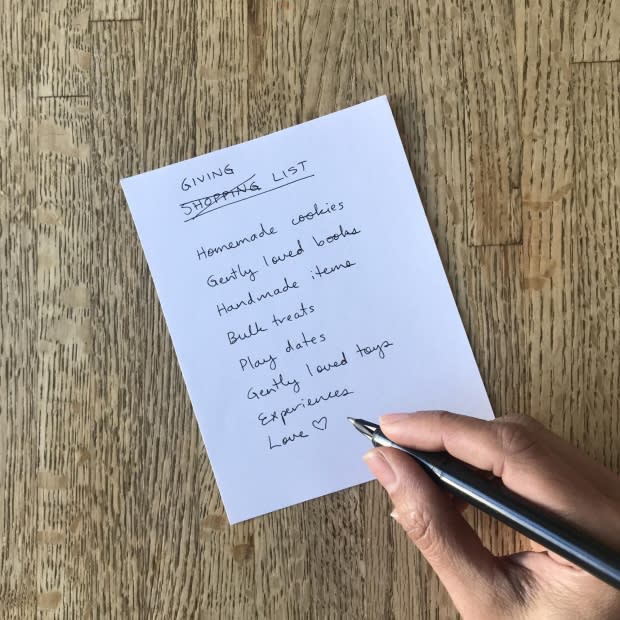A minimalist Christmas: How to be eco-cozy for the holidays
This holiday season, Laure Caillot is doing things a lot differently. She, her husband and their six-year-old daughter will spend a week in a remote cottage in the Laurentians.
Her parents, visiting from France, will join her and they'll focus on doing relaxing things together — without the usual pressures of over-consumption.
"We are going to just enjoy spending time together, with no added stress of making a big dinner at Christmas. Just simple, quiet, easy."
Caillot is a zero-waste consultant in Montreal's Rosemont district. For her, Christmas is becoming very low-key and planet-friendly. Her daughter will receive a couple of presents from Santa this year, but they'll probably be second-hand, purchased online on sites such as Kijiji.

Claire Lanctôt is also trying to be low-key this Christmas. She will be home with her family on their farm, Arlington Gardens, in the Eastern Townships.
"Our family is from a long line of advocates of voluntary holiday simplicity," she says.
"The most important part of the holidays is neither the gifts nor the conspicuous consumption but good company, good food and good cheer.
"My mother and I used to bake up a storm leading up to the holidays: Christmas cookies and pies," Lanctôt remembers.
"Mostly now, I find the holiday sweets excessive. The cookies have fallen by the wayside, as have the gingerbread houses."
Her family still enjoys a holiday meal and a special dessert, prepared using a lot of products they've grown themselves.
"A turkey dinner just isn't the same without a three-pie classic dessert selection: apple, pecan and pumpkin, which still rank high on our holiday list."

Plan your menu
Pamela Tudge suggests being careful about the food we prepare over the holidays. She's a part-time lecturer in Fine Arts at Concordia University.
Tudge studies kitchens and kitchen waste. She says the amount of waste increases at Christmas because of all the different holiday dinners. According to her, the key to reducing waste is by planning your menus.
Tudge says it helps to try to use every part of an ingredient somewhere in your meal. For example, "if you're going to use an orange sauce in one part of your menu, you can also use the peels in your dessert by making them into candied peel."
Tudge suggests people think about leftovers as well, since so much ends up in landfills. Plan on making sandwiches or soup with the leftover meats and vegetables, she said.
Tudge also recommends trying to reduce plastic packaging.
"You can use mason jars for all kinds of different things: bringing food to people's houses, packing them full of cookies, that kind of thing."
Doing the dishes
Environmentalists say plastic, disposable cutlery and Styrofoam plates and are also not a good choice at holiday get-togethers, even if you have a large crowd.
Anna Timm-Bottos of the Concordia University Centre for Creative Reuse (CUCCR) says washing dishes does not have to be a chore.
"It's actually a lovely time to be together."
Eco-friendly gifts
Environmentalists are still giving presents, but they're trying to make them more focused. Tippi Thole, a zero-waste activist on Montreal's South Shore, says homemade is always the most thoughtful.
"People feel compelled to give gifts and buy things for people that people don't really need.… Just to show your love by spending time, not money.

Thole will be making gifts this holiday season, giving friends and families edible gifts rather than disposable items. If she buys, it will be second-hand, if possible.
Thole says her 9-year-old son loves it when she gives him time as a present. For example, she will give him an envelope of coupons this Christmas, "and they're kind of like IOU's for our favourite activities or restaurants.…These memories last so much longer than any physical object. I find it adds so much more meaning to the holidays but also to our relationship."
Concordia's Timm-Boutros is giving her not quite one-year-old son a used toy as his main present this year.
"I got him a wooden train that I found second-hand, which is perfect. It's going to be great."
Before we buy anything, she says, we should ask certain questions: "Where did it come from? How is it made? Will it be useful? Will it hold up? And then, also, how will it be disposed of?"
Wrapping it well

Haley Clarke-Cousineau is a member of the environmental advisory committee in the town of Montreal West. She says one of the best presents she ever received was a ticket to see The Nutcracker with her aunt. It's a memory she'll never forget.
She says experiences are always the best presents. But she says if you do have to wrap something, try to make it eco-friendly,
The 17-year-old Dawson student says there are lots of great ideas on Pinterest, where people are using scrap fabrics, newspaper and pages torn from magazines.
"My mom keeps gift bags which are reused year after year."
Camille Gagné-Raynauld is with the environmental group Équiterre. She says she has colleagues who don't wrap gifts at all. Instead, they hide the presents in their home and make their children search for them. It makes getting a present into a fun game.
Getting to get-togethers
Gagné-Raynauld is also trying to have an environmentally friendly holiday. She says it's also important to think of transportation.
She suggests sharing cabs or taking public transit, "because you know, in bad weather, it's also better to have fewer cars on the road."

